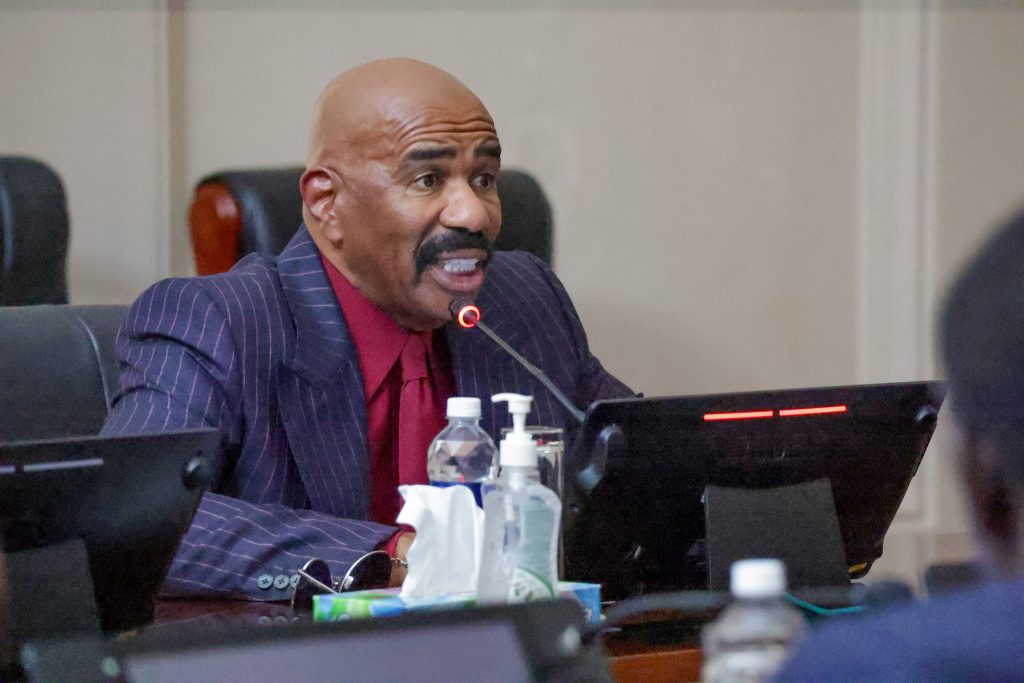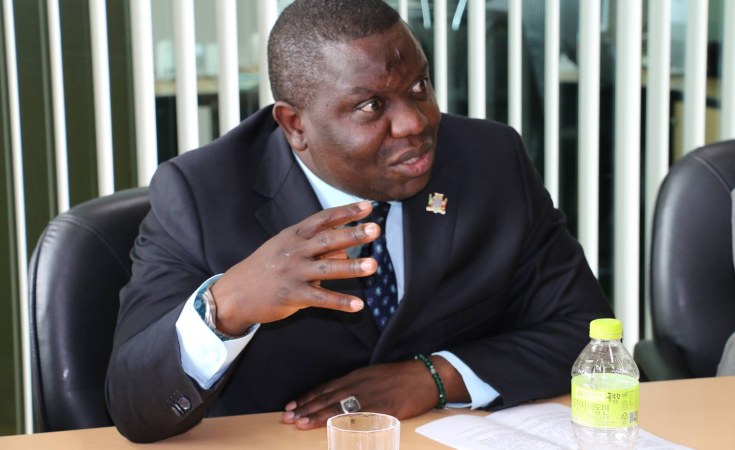
Steve Harvey’s offhand remark about jittery aides at Zambia’s State House uncovers a deeper truth about the leadership under President Hakainde Hichilema – one that prioritizes fear over inspiration. In a climate where silence is golden and loyalty trumps competence, true leadership has taken a backseat, leaving the country paralyzed by mediocrity and unchallenged power.
By Mpandashalo Mwewa.
Lusaka, Nov. 27 – In a moment that seemed plucked from a satirical drama, American comedian Steve Harvey unwittingly laid bare a startling truth about Zambia’s State House. His remark, though shrouded in humour, echoed like a thunderclap across the nation: “I have been on this continent for 18 years now doing things. I have been in front of many people in my life; but never in these hatchback chairs full of people who look nervous!” The imagery of nervous aides perched on cheap chairs paints a picture far more telling than the most damning editorial. This wasn’t just an off-the-cuff remark; it was a mirror held up to the leadership culture brewing under President Hakainde Hichilema.
Also Read: Blame the Blackout, Not the Leadership: Hamasaka’s Masterclass in Deflection! Clayson Hamasaka’s response to the power blackout exemplifies an administration more obsessed with deflecting blame and managing its image than confronting the real, life-threatening issues facing the country.
Unlike a benevolent dictator who rules with an iron fist but delivers results, Zambia appears to be grappling with a malevolent leader whose governance fosters fear and submission rather than inspiration and collaboration. Steve Harvey’s observation was a window into the suffocating atmosphere within the corridors of power – an environment where advisers are reduced to jittery spectators. The “nervous” men and women Harvey referenced are likely grappling with the impossible task of balancing truth with survival. In such an atmosphere, who dares to challenge the king when even sitting in the wrong chair could spell trouble?
Dictatorship doesn’t emerge in dramatic flashes; it seeps in through small cracks, cloaked in the guise of strong leadership. History is rife with examples of leaders who started by intimidating their inner circles before unleashing their wrath on the wider population. Steve Harvey’s sharp commentary wasn’t just about nervous aides; it was an indictment of a system that stifles dissent and erodes the confidence of those tasked with advising the president. It’s a dangerous cocktail: power wielded without restraint and subordinates too fearful to offer honest counsel.
But the comedian didn’t stop there – his quip about the “hatchback chairs” was more than a jab at furniture. It symbolized the dissonance between appearances and reality. While the government may trumpet its accomplishments and exude confidence to the public, the nervousness in the room revealed the hidden cracks. Beneath the glossy speeches and elaborate public relations machinery lies a culture of intimidation, where loyalty is valued over competence, and silence is rewarded over speaking truth to power.
The fallout from such a leadership style is profound. A culture of fear breeds mediocrity, not innovation. Scared advisors become yes-men, unable to challenge decisions or propose bold ideas. It’s no wonder that Zambia’s socioeconomic challenges persist when the very individuals charged with addressing them are rendered powerless by their own fear. As Steve Harvey inadvertently pointed out, a nation led by a nervous entourage is one headed for stagnation – or worse, decay.
Also Read: Deciphering the General’s Controversial Farewell: Battle for the Zambia Army’s Senior Service Identity! The Zambia Army has its identity as the senior service in the country. As Commander, you are expected to guard and protect this identity even if sometimes it may be at the expense of being misunderstood.
So, Steve Harvey’s encounter with Zambia’s State House wasn’t just a fleeting anecdote; it was a reality check for a nation at a crossroads. When even a guest can sense the tension in the room, it’s time for introspection. True leadership doesn’t demand fear; it inspires confidence. Zambia must ask itself whether it wants to continue down this road of nervous subordinates and unchecked power or rise to the challenge of fostering a government that values courage, truth, and collaboration. After all, as the saying goes, “The fish rots from the head.”
About Our Advocacy: Woodpecker’s Digest provides in-depth analyses and commentary on issues of national importance, alongside articles on personal development and health. We believe journalism can be a force for socio-economic change.
©2024 Woodpecker’s Digest.
Journalism for social change







